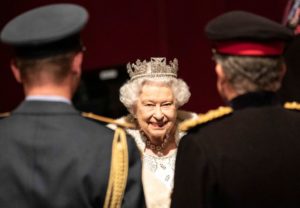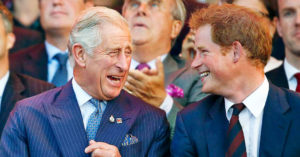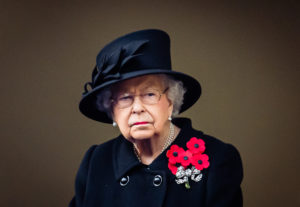The 70th anniversary of the Queen’s accession to the throne represents a strange juncture in the country’s history. Her Majesty’s stoical endurance through national and personal tribulation has cut deep. There has not been a life of monarchical duty continuously exercised over anything like the same time in British or English history.
But such is the nervousness that hangs over the monarchy’s future, in any rendition of the national anthem there is a palpable charge on the words, “long to reign over us, God save the Queen”. In that moment, one can sense a shivering fear that the Queen’s death may open the path to a troubling future where the forces stacked against the British monarchy, from outside and in, begin to overwhelm it — without there being any unifying idea about what could come next.
The Queen’s being was not always fused in this way with a near ideal form of British monarchy. The joyful festivities for the Silver Jubilee bank holiday in June 1977, for example, felt as much about a country needing to remind itself that one purpose of a monarchy is to create such a national occasion, as a celebration of the Queen herself.
Since Victoria’s reign established the idea that the monarchy’s legitimacy had, in part, to rest on public affection, the British have not continuously loved quietude in their monarchs. There was nothing austere about Edward VII: he ate excessively, smoked too much, gambled, and had a string of mistresses. Queen Victoria feared her son would bring down the monarchy. But after Edward VII died in May 1910, throngs of people waited through the night under a deluge of rain outside Westminster Hall to see the coffin of a man who appeared, at least, rather to enjoy being King. When it came to his funeral procession, the crowds were much larger than they were for his mother.
But the present Queen is a successful part of a continuous story about duty that began with the monarchy her grandfather George V established. She is the last of a family trio. Although Edward VII did as much for the modern monarchy as his parents, his reign belongs to another world, one in which the British monarch still had real political influence. During the constitutional crisis of 1909-10, Edward VII successfully demanded a general election before the Liberal government could pass its budget after its defeat in the House of Lords, and then another before it could expect to legislate to remove the Lords’ right of veto — although he did not live to see that vote.
In Europe, he sought to check German power, leaving the Kaiser convinced his uncle was “Satan”, standing between Germany and its world destiny. By visiting Paris in 1903, against the advice of British officials, and transforming in just four days French public opinion of him, he played his part in the Entente Cordiale of 1904. Working his other nephew, Tsar Nicholas II, while influencing the appointments of the British ambassador in St Petersburg and the Russian ambassador at the Court of St James’, he was also instrumental in realising the 1907 Anglo Russian Entente.
As the pre-1914 European world approached its dissolution, Edward VII, as elder statesman of a continent-wide royal family dominated by Victoria and Albert’s descendants, appeared a peacemaker. A popular song in 1909 proclaimed “as long as there’s a King like good King Edward there’ll be no war”. On the King’s sudden death, the Russian foreign minister Alexander Izvolsky declared: “We have lost the mainstay of our foreign policy.” In France, Edward was mourned in the republican corridors of power in Paris and in provincial towns. When the moment of crisis arrived in August 1914, leaving the Kaiser to contemplate the terrible necessity for Germany to wage war against both Russia and France to achieve any of his ambitions, he complained bitterly that “the dead Edward was stronger than the living one”.
No European monarch could ever have such hope and dread projected onto them again. By the end of the First Word War, Edward VII’s second son had turned Prince Albert’s House of Saxe-Coburg and Gotha into the Windsors, surrendered the use of all German titles, and refused asylum to the Tsar and Tsarina, both his first cousins, to protect the British monarchy from the sins of association. Instead of continental leadership, George V — who had become heir on the death of his older brother from the Russian flu — offered Britain the idea of a monarchy based on dutiful, quiet service and a largely domestic royal family.
Of course, the Windsor monarchy was still bound to the empire in the Twenties. George V wanted to be an imperial king replete with imperial ceremony; before the war, he had insisted on travelling to Delhi to be crowned Emperor of India. But, whatever its creator’s imperial emotions, the post-1914 monarchy had, in a world where European decline was inescapable, to be detachable from empire. A good part of the Queen’s achievement has been to facilitate that imaginative separation while, through the Commonwealth, preventing the monarchy falling into British parochialism detached from the wider world.
Above all, the emotional rituals of the new Windsor monarchy were tied to the rituals of remembrance created by the losses of the First World War. These liturgies were reinvigorated by the Second World War both in its national mythos of virtuous sacrifice and the imperial mobilisation of the Indian Army as the largest volunteer force in history. On 11 November 1920, George V unveiled the Cenotaph as part of a procession to Westminster Abbey for the funeral of the Unknown Warrior. On entering the Abbey two-and-a-half years later for her wedding to the future George VI, the then Duchess of York – the future Queen Mother – laid her bouquet on the tomb in honour of her brother who fell at the Battle of Loos, beginning a tradition for royal brides, upheld by the Queen and later the Duchess of Cambridge. At her own request, the Queen Mother’s funeral wreath was placed on the grave. The fusion of the seasons of monarchical life with the national remembrance of war is why the Queen’s absence from last year’s Cenotaph service was such a watershed moment. Nothing could state more potently that her reign is coming to an end.
In its post-1914 casting, the monarchy was far from constitutionally irrelevant. George V played his part in normalising Labour governments, and effectively demanded that Ramsay MacDonald form the National government when MacDonald came to the Palace to resign in August 1931. Until the Conservative party changed its leadership rules, the monarch had the formal discretion to choose a Conservative Prime Minister on the departure on an incumbent, a power the Queen exercised when she chose Harold Macmillan in January 1957 and Lord Douglas-Home in October 1963. But during George V’s reign, a great deal of constitutional service became passive: dealing with boxes without active responsibility for their content and performing the constitutional ceremony of the opening of Parliament.
In this requirement for quiescence lay a problem that would haunt George V and perhaps does the Queen. It is not only the monarch who must accept an inert role, but the heir after years of waiting for the Crown to be theirs. In George V’s case, his eldest son’s temperamental constitutional unsuitability was thoroughly compounded by his unwillingness to make a conventional marriage and have children.
But Edward VIII’s short reign paradoxically strengthened the Windsor monarchy. Once George VI acceded to the throne, he was helped by the very fecklessness of his older brother. What story could more demonstrate the idea of necessary duty than one where the stammering second son had to take the Crown from a once-idolised brother and remake himself as a public man? During the Second World War all aspects of the Windsor monarchy became one when that King and his Queen partook in the national experience of aerial assault by working in Buckingham Palace during the Blitz and refusing ministerial advice to send the young princesses to Canada.
The Queen’s inheritance of George V’s monarchy was complex. As was the case with her grandfather and father, the duties of the Crown should not have fallen upon her. But by the time she was born in 1926, her father had, given his brother’s attitude towards marriage, good reasons to suspect they eventually could; and her grandfather hoped, while she was too young really to comprehend what was happening around her, they would. If she shares with them an ability to accommodate duty foisted by circumstance, her temperamental dislike of excess has had to work, not in an age of war but amid rapidly rising consumerism and then a turn to performative public displays of grief. To heighten the dissociation, the appetite for communal expressions of emotion began in the days after Princess Diana’s death, when the Queen’s self-containment was the very opposite of the new aesthetic.
Given this divergence between the monarch and the times, it is perhaps unsurprising that the wholehearted affection felt for the Queen has only come in the second half of her life. This is in part the effect of the sheer duration of her endurance. But it is a function, too, of her character. She has absorbed change she had little reason to like, and so reinforced the story of duty to which the House of Windsor laid claim. Precisely because the country is significantly more secular than when she came to the throne, her Christianity is also an asset. Where the religious rituals of national life might appear hollow, she plays her part blessed by faith. Since some of the symbols are complex in a multi-national Union that was never a spiritual union, she also appears at ease in the ambiguity, seen at worship as she is at Sandringham in a church of which she is head and at Balmoral at Crathie Kirk, a church where she is not. As the United Kingdom has become more divided, she has simply carried on as head of state, as if as long as she performs her duty, the country will be more than it seems on the surface to be.
But the idea of the domestic royal family has been a greater burden for the Queen than it was even for her grandfather. If, on the other side of her reign, lies a great unknown, it is one she has played her part in bringing about. What she has given of her own qualities to the kingdom coexists with mishaps with her heirs. In marrying her third-cousin for love, she inserted the Windsors back into the part of Victoria and Albert’s continental diaspora that had made it back to Britain through the wreckage of the First World War and its aftermath. But no more European royal weddings would materialise. Instead, Prince Charles was left caught between the idea he could marry for love and the eventual necessity of a near arranged domestic aristocratic marriage he was ill-equipped to tolerate. Meanwhile, the Queen’s longevity means that there have been three generations of spares to pain and embarrass her. Like George V before her, the Queen will not to live to see where the story of her life as royal parent of Prince Andrew and grandparent of Prince Harry ends.
For a moment, the future can wait, as it did for George V. His Silver Jubilee in May 1935, six months before his death, turned out to be an emotional occasion. After the crowds had lined the streets to see him and Queen Mary process to a service at St Paul’s, he took to the radio to declare: “I can only say to you, my very dear people, that the Queen and I thank you from the depths of our hearts for all the loyalty — and may I say? — the love which this day and always you have surrounded us.” After driving through the East End, he said, “I’d no idea they felt like that about me.”
The problem he bequeathed the monarchy as a father had an unexpected resolution: Mrs Simpson was the strange grace note in the story, the contingency that spared the country a disastrous monarch during an attempted conquest. Since Andrew and Harry are not heirs who can be broken or redeemed by the Crown, there will be no resolution to the contrasting problems they cause; the Queen must pass them unabridged to Prince Charles.
Beyond his brother and youngest son, Charles will inherit a Crown that has reached a stasis by very virtue of the Queen’s remarkable success. She was sufficiently formed by the Second World War to be George V and George VI’s spiritual heir. But no child or grandchild of hers could ever have been like her, whatever kind of parent or grandparent she was. She must know the future monarchy, if it survives, will be one that has of necessity again been reinvented.
By giving unflinching service according to the Windsor character script and rituals she has emphatically answered the question of what purpose a constitutional monarchy still serves. There will not be such a sharp rejoinder to republicanism ever again. This will be Prince Charles’s burden. It will also belong to us all who are the Queen’s subjects. If we want the monarchy to continue, we will have tacitly to give our consent to leaving the Age of Elizabeth Windsor behind.
Disclaimer
Some of the posts we share are controversial and we do not necessarily agree with them in the whole extend. Sometimes we agree with the content or part of it but we do not agree with the narration or language. Nevertheless we find them somehow interesting, valuable and/or informative or we share them, because we strongly believe in freedom of speech, free press and journalism. We strongly encourage you to have a critical approach to all the content, do your own research and analysis to build your own opinion.
We would be glad to have your feedback.
Source: UnHerd Read the original article here: https://unherd.com






